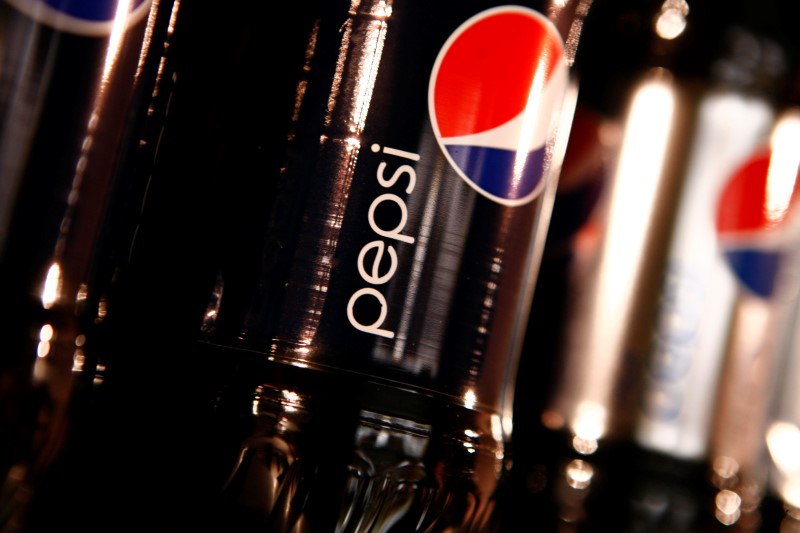Investing
Analysis-Billionaire Ambani adopts familiar playbook in India cola battle vs Coke, Pepsi

© Reuters. FILE PHOTO: A bird flies past a Reliance Industries logo installed on its mart in Ahmedabad, India January 16, 2017. REUTERS/Amit Dave
By Praveen Paramasivam and Aditya Kalra
CHENNAI/NEW DELHI (Reuters) – Indian industrial giant Reliance is reviving a historic local cola brand with plans to use its vast retail network, slash prices and tap nationalist sentiment to challenge U.S. beverage giants PepsiCo (NASDAQ:) and Coca-Cola (NYSE:) in a key market.
Controlled by billionaire Mukesh Ambani, Reliance this month launched revamped Campa drinks, sugary sodas popular in India in the 1970s and 1980s before disappearing from shelves as the U.S. giants expanded rapidly in a liberalising economy.
At first glance it may seem that Ambani will find it tough to loosen Pepsi’s and Coca-Cola’s stranglehold of a market Euromonitor estimates is worth $4.6 billion and set to grow 5% a year until 2027. Other well known tycoons have tried to go toe-to-toe with the drinks giants, and failed, most notably Richard Branson with his Virgin Cola.
But Asia’s richest person has famously disrupted India’s telecoms market seven years ago with cut-throat pricing to make Reliance the leading player in that industry. And he’s applying some of that same strategy in his soft drinks venture.
“Coca-Cola and Pepsi are unused to a nationwide challenge, and Reliance has the financial muscle and reach to challenge them with a local brand with high nostalgic value,” said Amulya Pandit, a consultant at Euromonitor International.
A person with direct knowledge of Reliance’s plan said it aims to open some factories of its own or as joint ventures to make Campa, and take the soda to hotels, restaurants and in-flight sales. Production of Campa is currently outsourced, after its $2.7 million acquisition of the brand last year.
The company is heavily discounting in-store prices. A two-litre Campa Cola bottle is priced at 49 rupees (60 U.S. cents) in stores, a near 50% discount on its label price, and around a third lower than 2.25-litre Coke and Pepsi variants, a Reuters check showed. The smallest bottles of Campa Cola and Coke both cost 10 rupees, while Pepsi starts from 12 rupees.
“The price will be disruptive across,” said the person, who added Reliance is planning an advertising spree during the upcoming popular IPL cricket tournament and is in talks with at least three teams to make Campa their refreshment partner.
The person did not want to be identified as the strategy is confidential. Reliance did not respond to a request for comment, while Pepsi said it doesn’t comment on competition as a policy.
Coca-Cola said it has broadly kept prices of its small bottles unchanged since last year and was focused on expanding distribution. “Having new players in the market presents a great opportunity for investments to develop the market further,” it said.
Reliance, India’s top retailer, will supply Campa to its 2,500 grocery outlets and thousands of smaller non-network stores as part of its new consumer goods push from which it has set an internal target of $6.5 billion in annual revenues within five years.
The company also has a grocery shopping app and a wholesale vertical under which it supplies consumer goods to 500,000 mom-and-pop stores, which it will also tap for Campa sales.
‘GREAT INDIAN TASTE’ VS FOREIGN BRANDS
Reliance’s cola and consumer goods foray is being driven by T. Krishnakumar, an executive who worked for nearly 17 years at Coca-Cola in various leadership roles.
Pepsi and Coca-Cola will also cautiously eye Reliance’s marketing strategy after it targetted nationalist sentiment and nostalgia by promoting Campa as a homegrown brand with “Great Indian Taste” and a “rich heritage”.
A former Pepsi executive who did not want to be identified because of the sensitive nature of the subject said the U.S. firm has always been worried about local products marketed with an “India First” agenda, especially at a time when Prime Minister Narendra Modi himself backs self-reliance.
The rivalry is already playing out in the market.
In five Reliance outlets that Reuters visited in Mumbai in India’s west, Chennai in the south and Lucknow in the north, Campa cola or lemon plastic bottles were displayed at the main entry gates or placed on shelves just next to the rivals.
At one Chennai outlet, a Reliance store manager said this year they were placing Campa at the entrance for promoting it, with rivals tucked behind it and not visible at first glance. Another city store employee said 30 Campa bottles were being sold for every 100 of Pepsi and Coca-Cola.
For now, the U.S. rivals have an upper hand. Pepsi and Coca-Cola drinks are available in at least 3 million Indian outlets and the companies have a widespread logistics network, dozens of factories and the advantage of a taste preferred by many, said Alok Shah, a consumer analyst at India’s Ambit Capital.
“We’ll need to wait and watch to see if consumers switch to Campa,” he said, adding that Pepsi and Coke remain aspirational foreign brands for many Indians, offered at largely similar small-pack prices.
Srinivas Rao said he still loves Coca-Cola’s Thums Up, a domestic brand it acquired in 1993 and is its best-selling one in India, unlike in the U.S. where Coke dominates.
“We buy Thums Up every time we eat biryani or meat at home. We are not drawn to discounts from other brands including Campa,” Rao said outside a Reliance store in Chennai.
Read the full article here

-

 Make Money6 days ago
Make Money6 days agoHow to Create and Sell Digital Products Online (Make Extra Money)
-

 Investing6 days ago
Investing6 days agoIs Apple Releasing an ‘Ultra-Thin’ iPhone 17 Air? New Report
-

 Side Hustles7 days ago
Side Hustles7 days agoCreate Your Wealthy, Purposeful Life: Business Expert’s Tips
-

 Investing6 days ago
Investing6 days agoUS data center electricity and water use to increase significantly by 2028: report By Investing.com
-

 Investing5 days ago
Investing5 days agoMoldova breakaway region to face new power cuts on Saturday, officials say By Reuters
-

 Investing5 days ago
Investing5 days agoReebok Co-Founder Backs Syntilay’s New AI, 3D-Printed Shoe
-

 Side Hustles5 days ago
Side Hustles5 days agoHow to Survive High-Demand Seasons Without Losing Customers
-

 Side Hustles7 days ago
Side Hustles7 days agoMinimum Wage Is Increasing In These 21 States This Year


















